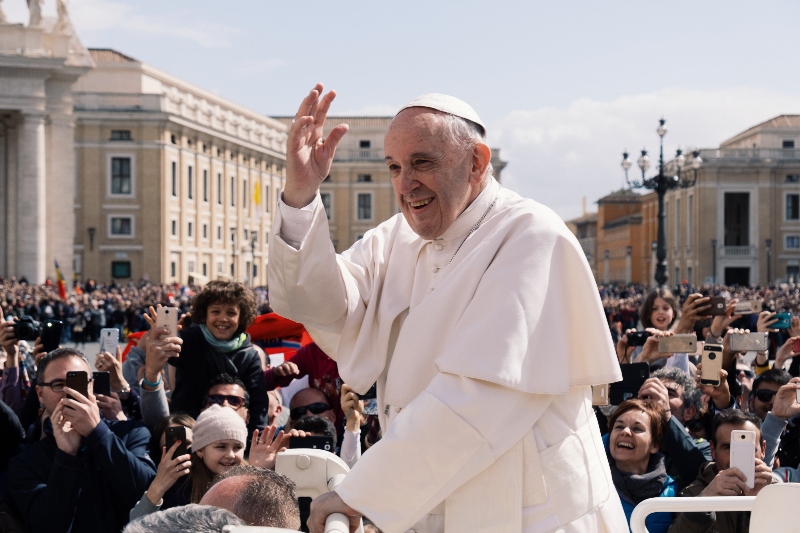Pope offers clear biblical mandate to care for creation
The Papal encyclical is a most welcome contribution to the climate debate, writes John Weaver

Pope Francis has written an exhaustive encyclical to all the churches of the Roman Catholic communion, Laudato si’, mi’ Signore – ‘Praise be to you, my Lord’. He affirms that all species give glory to God, who cares for each one (Luke 12:6, Matthew 6:26).
The Pope recognises the seriousness of the global environmental crisis and draws out its implications for the world’s poor and disadvantaged. He identifies the human causes, and lays the blame fairly and squarely on the activities of the developed world.
This clear, factually based, and hard-hitting paper from the Pope is a most welcome contribution to the climate debate in the run-up to the Paris Climate Change Conference in November-December this year.
With St Francis as his inspiration the Pope expresses his concern about our common home and the need for global, sustainable, integral, development. He challenges us to avoid the short-term outlook that has dominated politics, and calls for a new political will.
He maintains that we recognise that the destruction and wanton disregard for the environment is both a sin against ourselves and against God.
He outlines the scientific consensus and develops the thesis of the climate as a common good or a global common. In rehearsing the scientific observations of drought, flood, loss of rainforests, reduction in biodiversity, aquifers, coral reefs and glaciers he challenges the developed world to see the impacts on the poor in the form of water poverty and crop failure. These demonstrate global inequality and injustice, and threaten the breakdown of society. He observes that world leaders fail to hear the cry of the earth and the cry of the poor.
He concludes that ‘In the meantime, economic powers continue to justify the current global system where priority tends to be given to speculation and the pursuit of financial gain, which fail to take the context into account, let alone the effects on human dignity and the natural environment.’ (paragraph 56)
The Pope offers a clear biblical mandate to care for creation calling for a Christ-like attitude, which recognises that all people are in the image of God and none is superfluous. He presents a picture of a sacramental creation, where God is manifest and present in the whole created world, and where all things are created, redeemed and reconciled through Christ (Colossians 1:15-20). The earth is to be seen as a collective good - a shared inheritance, which offers fundamental rights to the poor and the voiceless.
The Pope pulls no punches in laying the blame for environmental degradation and destruction on human beings. While recognising that technological creativity has brought vast benefits to humankind, he warns against the global view of technological progress, the mastery of creation, domination, and exploitation. He rightly observes that progress has become the new mantra, but such progress must be in the service of all humanity.
He challenges us to recover Christian values and goals in our relationship with the environment, others, and God. These I observe are the pre Fall relationships of Genesis 2, which we see broken in Genesis 3, when human beings decide that they want to play God and have the power and control that belongs to God. Christ calls for their renewal in the two commands to love God and to love our neighbour (Matthew 22:37-40).
The Pope rightly recognises that ecology teaches us that everything is interconnected. Environmental degradation affects social structures and cultural identity, the very meaning of life and community. We must consider what kind of world we want to leave for those who come after us. This leads us to consider the meaning of our own lives - who are we, and what are we here for?
He recognises the various global governmental attempts to address these issues, but stresses the need for transparent political processes in finding agreement on the governance of the ‘global commons’.
He also notes that any technological solution will be powerless to solve these serious problems if we lose our moral compass to live in harmony, make sacrifices, and treat others well. He challenges us to an ecological conversion whereby the effects of our encounter with Jesus Christ become evident in our relationship with the world around us. He calls us to find joy and peace in a life of simplicity, with love overflowing in our acts of care for creation, as we journey toward the Sabbath of eternity (Revelation 21:5).
This encyclical is profound, recognised by the evangelical Lausanne Creation Care Network, who declared their commitment to care for God’s creation and to serve the poor affected by climate change impacts.
The encyclical presents a message that we all need to hear and act upon. Professor Miles Allen, Head of the Climate Dynamics Group at Oxford University said, ‘What I find most puzzling is the suggestion the Pope has no business to talk about climate change. Critics now largely agree with mainstream climate science so if Pope Francis can’t speak up for our unborn grandchildren, then God help us all.’
Image | Ashwin Vaswani | Unsplash
The Revd Dr John Weaver is the Chair of the John Ray Initiative: connecting environment, science and Christianity
He was President of the Baptist Union of Great Britain 2008-9. This article originally appeared on Ethics Daily and is republished with permission.
Baptist Times, 25/06/2015